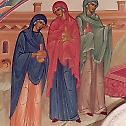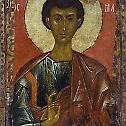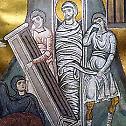Theology
The Faith of the Myrrhbearing Women
4. May 2012 - 9:40"And when the Sabbath was past, Mary Magdalene, and Mary the mother of James, and Salome, had bought sweet spices, that they might come and anoint Him. And very early in the morning the first day of the week, they came unto the sepulcher at the rising of the sun. And they said among themselves, Who shall roll us away the stone from the door of the sepulcher?" (Mk. 16:1-3).
Brothers and sisters! Can you imagine the state of mind these Myrrhbearing women were in? For those who lived through Soviet times in Russia and through the persecution of the Church, it is so understandable. In some churches, as in the outskirts of Kiev, this service (the Burial of the Savior) was performed at night. People made their way to such a church through dark streets. Anything could happen, you had to be careful of everything. Neighbors might hear that you went somewhere at night; and you could be stopped on the street. And the service itself in church and the carrying of the Shroud around the church could be interrupted by the authorities. One did not know if tomorrow, on Holy Saturday, this already semi-Easter Liturgy would be performed, because the priest might be arrested.
Why is the Sunday After Pascha dedicated to the Apostle Thomas?
26. April 2012 - 15:24Belief in the great miracle of the Resurrection did not come to the disciples right away. The first witnesses were the myrrh-bearing women. It was still dark out when they came to the cave in the garden belonging to Joseph of Arimathea. The stone which had sealed the tomb was now rolled away. While they stood in astonishment, an Angel stood before them and said, Fear not ye: for I know that ye seek Jesus, which was crucified. He is not here: for he is risen, as he said. Come, see the place where the Lord lay (Mt. 28:5–6). It was enough for them to see the empty tomb and hear the words of the Angel in order for them to believe. Their sensitive and loving hearts were not touched by doubt. When they ran to tell the Apostles, Jesus Himself met them and said, All hail. And they came and held him by the feet, and worshipped him (Mt. 28:9). The Apostles did not believe the women (cf. Mk. 16:11).
Lazarus Saturday
9. April 2012 - 10:15“In the same way we cry to Thee, O Conqueror of death: Hosanna in the highest, blessed is He Who comes in the name of the Lord”
Troparion (hymn) sung on Lazarus Saturday
Great is this Holy Day, brothers and sisters! Just think of it, “Conqueror of death”! There have been many conquerors in the history of humanity: many gifted doctors have conquered many sicknesses, many military leaders have conquered tremendous armies, even entire countries. There have been conquerors of space such as the inventors of automobiles, airplanes; conquerors of distance — the inventors of the telephone, telegraph, and so on. But “Conqueror of death” — the whole world does not know of anyone else but Jesus Christ. He alone. Even the so-called “unbelieving world” cannot mention another name. No one among the most prominent people would ever even attempt to make such a claim. But He is, was, and will be — our Savior and our Lord.
Homily on the Fourth Sunday of Great Lent. The Significance of Fasting in the Struggle against Fallen Spirits
27. March 2012 - 14:48The Lord said to His Apostles about the evil spirits, This kind can come forth by nothing, but by prayer and fasting (Mk. 9:29). Here is a new aspect of fasting! Fasting is acceptable to God when it is preceded by the great virtue of mercy; fasting prepares a reward in heaven when it is foreign to hypocrisy and vainglory; fasting works when it is joined with another great virtue—prayer. How does it work? It not only tames the passions in the human body, but it enters into battle with the spirits of evil, and conquers them.
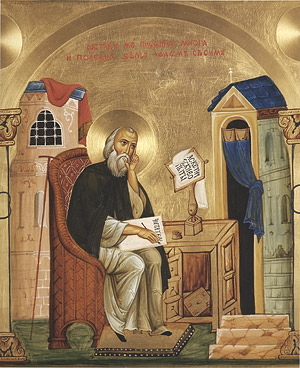 How can fasting, which is actually a bodily podvig [ascetical labor], work or cooperate with prayer in a war against spirits? Why do the bodiless spirits submit to the power that fasting has over them?
How can fasting, which is actually a bodily podvig [ascetical labor], work or cooperate with prayer in a war against spirits? Why do the bodiless spirits submit to the power that fasting has over them?
The reason fasting works against the evil spirits lies in its powerful influence upon our own spirits. When the body is tamed by fasting, it brings freedom, strength, sobriety, purity, and refinement to the human soul. Our spirit can withstand its unseen enemies only when it is in such a state. But as for me, said the God-inspired David, When they (the demons) troubled me, I put on sackcloth. And I humbled my soul with fasting, and my prayer shall return to my bosom (Ps. 34:13). Fasting gives the mind sobriety, while prayer is the weapon the mind uses to drive away the invisible adversary. Fasting humbles the soul, and frees it from the callousness and inflatedness brought on by satiety; while the prayer of one who fasts becomes especially strong. Such prayer is not just external, but comes from the very soul, from the depths of the heart. Fasting directs and carries prayer to God.
The Fourth Sunday in Great Lent
27. March 2012 - 14:44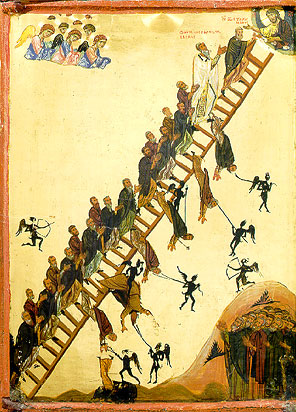 In the name of the Father, and of the Son, and of the Holy Spirit.
In the name of the Father, and of the Son, and of the Holy Spirit.
More than once, brethren, the fact has been mentioned that on each Sunday in the Great Fast (i.e., Lent) there are other commemorations besides that of the Resurrection. Thus, on this day, the Church glorifies the righteous John of the Ladder, one of the greatest ascetics, which the Church, in speaking of them, calls "earthly angels and Heavenly men."
These great ascetics were extraordinary people. They commanded the elements; wild beasts willingly and readily obeyed them. For them, there were no maladies they could not cure. They walked on the waters as on dry land; all the elements of the world were subject to them, because they lived in God and had the power of grace to overcome the laws of terrestrial nature. One such ascetic was St. John of the Ladder.

